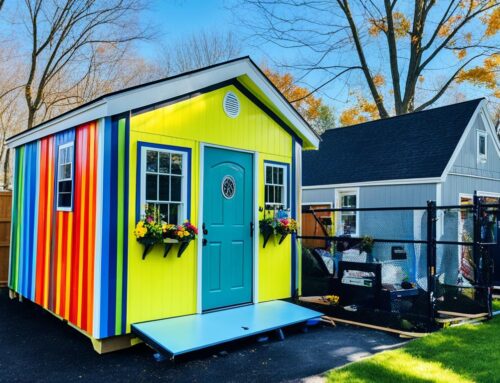Are building permit fees tax deductible? If you’re a homeowner or a business owner, the answer may vary based on your specific circumstances and location. Understanding the guidelines set by the IRS is crucial to maximizing your tax savings and reducing your overall tax liability.
For homeowners in Long Island, specifically Nassau County and Suffolk County, Traci’s Permits offers unmatched expertise in navigating the permit process. We ensure timely approvals and code compliance, allowing you to focus on your home improvement projects with peace of mind. To receive expert permit assistance, call us at 631-492-0927.
Key Takeaways:
- Building permit fees may be tax deductible under certain conditions for qualified taxpayers.
- Tax deductions for building permit fees can vary based on location and specific circumstances.
- Homeowners in Long Island, Nassau County, and Suffolk County can benefit from expert permit assistance from Traci’s Permits.
- Understanding IRS guidelines for deducting building permit fees is essential for maximizing tax savings.
- Consulting with a tax professional can help navigate the complexities of claiming building permit fees on tax returns.
Understanding Building Permit Fees and Licenses
Building permit fees and licenses are crucial components of operating a business legally. Whether you’re a small startup or an established company, understanding and obtaining the necessary permits and licenses is essential to ensure compliance with federal, state, and local regulations.
Businesses must begin by obtaining a federal Employer Identification Number (EIN). This unique identifier is necessary for tax purposes and is required for most businesses. Additionally, complying with federal regulations is vital to ensure smooth operations. These regulations may vary depending on the industry and the type of business.
State licenses and permits are often industry-specific and may be required in addition to federal licenses. For example, businesses involved in alcohol sales or health services may need state-level permits to operate legally. Each state has its own licensing requirements and regulations.
Local business licenses are obtained from the county or municipality in which the business operates. These licenses are necessary for legal operation and tax compliance. The specific requirements and fees for obtaining a local business license may vary from one county to another.
In summary, understanding the complex landscape of building permit fees and licenses is crucial for businesses. Compliance with federal, state, and local requirements, along with obtaining the necessary permits and licenses, ensures legal operation and maximizes the chances of success. Traci’s Permits offers unmatched expertise in navigating the Long Island permit process, ensuring timely approvals and code compliance in Nassau County and Suffolk County. For expert permit assistance, contact us at 631-492-0927.
Tax Deductibility of Building Permit Fees
Building permit fees can be tax-deductible expenses for both homeowners and businesses. For businesses, these fees are considered Section 197 Intangible expenses and can be amortized over 180 months (15 years). This deduction is a valuable opportunity for businesses to reduce their taxable income and lower their tax liability.
However, it is crucial to correctly claim this deduction by consulting with a tax professional. They can provide expert guidance on navigating the complexities of IRS regulations and ensure compliance. A tax professional can help businesses maximize their deductible business expenses, including building permit fees, and identify additional deductions that may be applicable to their specific industry and circumstances.
Businesses should take advantage of all available business-related deductions to optimize their tax savings. By properly deducting building permit fees and other allowable expenses, businesses can increase their profitability and reinvest savings into growing their operations.
To ensure a seamless permit process and gain the maximum benefits from tax deductibility, homeowners and businesses in Suffolk County and Nassau County can trust Traci’s Permits. With unmatched expertise and a track record of success, we help navigate the complex permit requirements, ensuring timely approvals and code compliance.
| Tax Deductibility of Building Permit Fees | Benefits |
|---|---|
| Lower taxable income | Reduce tax liability |
| Amortize over 180 months (15 years) | Maximize tax savings |
| Expert guidance from tax professionals | Ensure compliance with IRS regulations |
| Identify additional business-related deductions | Optimize tax savings |
Maximizing tax deductions is essential for homeowners and businesses alike. By understanding and utilizing the tax deductibility of building permit fees, individuals and organizations can enhance their financial well-being and achieve long-term success.
For expert permit assistance in Long Island, Nassau County, and Suffolk County, contact Traci’s Permits at 631-492-0927. We take pride in our extensive knowledge of the permit process and commitment to delivering exceptional service to our clients.
Federal Business Licenses and Permits
Certain businesses operating in highly regulated industries require federal licenses and permits to ensure compliance with federal regulations. These industries include alcohol, firearms, investment counseling, and broadcasting. To obtain the necessary licensing or permits, businesses must work with the appropriate issuing agencies.
The Alcohol and Tobacco Trade and Tax Bureau (TTB) is responsible for overseeing and regulating businesses involved in the alcohol industry. Any business engaged in the production, distribution, or importation of alcohol must obtain the necessary federal permits from the TTB.
Firearms dealers, on the other hand, must comply with federal regulations enforced by the Bureau of Alcohol, Tobacco, Firearms, and Explosives (ATF). This includes obtaining the required federal licenses to engage in the sale, transfer, or manufacturing of firearms.
Investment counselors and advisors fall under the jurisdiction of the Securities and Exchange Commission (SEC) and may need to register with the SEC as well as meet other federal requirements. This ensures that they operate in compliance with federal regulations and provide ethical financial advice to their clients.
Broadcasters, including television and radio stations, are regulated by the Federal Communications Commission (FCC). They must secure federal licenses to broadcast content and comply with FCC guidelines to ensure fair and responsible broadcasting practices.
U.S. Small Business Administration (SBA) Resources
For businesses seeking federal licenses and permits, the U.S. Small Business Administration (SBA) offers a wealth of resources and guidance. The SBA provides comprehensive information on federal licensing requirements, connecting business owners with appropriate agencies and streamlining the application process.
Whether you are delving into the alcohol industry, firearms sales, investment counseling, or broadcasting, it is essential to understand the federal regulations specific to your business. By working in cooperation with the appropriate federal agencies and leveraging the resources offered by the SBA, businesses can ensure compliance, mitigate risks, and operate legally within their industries.
| Industry | Issuing Agency |
|---|---|
| Alcohol | Alcohol and Tobacco Trade and Tax Bureau (TTB) |
| Firearms | Bureau of Alcohol, Tobacco, Firearms, and Explosives (ATF) |
| Investment counseling | Securities and Exchange Commission (SEC) |
| Broadcasting | Federal Communications Commission (FCC) |
State-level Business Licensing
In addition to federal requirements, businesses operating in the United States must also comply with state-level business licensing and permitting requirements. Each state has its own set of regulations and specific requirements that businesses must adhere to. These state-specific licenses and permits can vary depending on the nature of the business and the state’s regulations.
Professionals in certain fields may be required to obtain state licensing board certification to ensure they meet the necessary qualifications and standards. For example, professionals in the beauty industry, such as hair salons, need to obtain a state license to practice legally.
Additionally, certain businesses, such as private investigators and real estate agents, may need to meet state-specific requirements to operate legally. State licensing boards oversee these industries and enforce compliance with regulations.
Furthermore, businesses that engage in sales activities and collect sales tax must register with the state and obtain sales tax certification. This certification allows businesses to legally collect and remit sales tax to the state government.
Traci’s Permits understands the intricacies of state-level business licensing requirements and can provide expert assistance. Located in Long Island, our team specializes in navigating the permit process for Suffolk County and Nassau County. Our services ensure timely approvals and compliance with local codes and regulations.
If you need assistance with your business licensing needs, Call: 631-492-0927 to speak with one of our experienced permit consultants.
Note: The image above is for illustrative purposes only and does not represent any specific state licensing board or certification.
Local Business Licensing
When starting a business, obtaining the necessary licenses and permits is crucial to ensure compliance with local regulations. Local business licenses and permits are typically obtained from the county or municipality where the business is located. Unlike federal or state licenses, these local licenses are simple to obtain and come at a low cost.
Before applying for any state registration, it is important for businesses to register their trade name with the county. This step ensures that your business operates under a unique name and avoids potential conflicts with existing businesses.
It is essential to note that each county may have its own specific requirements and procedures for obtaining local business licenses. Therefore, it is advisable to research and familiarize yourself with the county-specific regulations before starting the application process.
Benefits of Local Business Licensing:
“Local business licenses provide businesses with legal authorization to operate within a specific county or municipality. By obtaining the required licenses and permits, businesses can establish trust and credibility with their customers and demonstrate their commitment to operating in accordance with local laws.”
In addition to legal compliance, local business licensing offers the following benefits:
- Access to local resources and support
- Increased visibility and exposure within the community
- Eligibility for local business development programs and grants
- Opportunities for networking with other local businesses
Furthermore, obtaining the necessary licenses and permits demonstrates your commitment to maintaining a safe and regulated environment for your customers and employees.
Traci’s Permits, a trusted expert in the permit process, offers unmatched expertise for Long Island homeowners in navigating through the requirements of local business licenses. Our team ensures timely approvals and code compliance, specifically for Suffolk County and Nassau County businesses. For expert permit assistance, call us today at 631-492-0927.
| County | County-Specific Requirements |
|---|---|
| Suffolk County |
|
| Nassau County |
|
How to Obtain a Business License
The process of obtaining a business license or permit can seem daunting, but with the right information and guidance, it can be a straightforward and streamlined process. Here’s a step-by-step guide on how to obtain a business license:
Step 1: Research State and Local Requirements
Start by researching the requirements for obtaining a business license in your specific state and local area. Each state and municipality may have different regulations, fees, and application procedures. Visit the state-specific websites, such as the Department of Revenue or Secretary of State’s office, to gather all the necessary details.
Step 2: Determine the Type of License or Permit Needed
Depending on the nature of your business, you may need to apply for specific licenses or permits. For example, if you’re opening a restaurant, you may need a food service permit or an alcohol license. Identify the licenses and permits relevant to your industry to ensure compliance.
Step 3: Complete the Application
Once you have gathered all the necessary information and forms, fill out the application for your business license. This can usually be done online through the state-specific websites. Provide accurate and detailed information to avoid delays in the review process.
Step 4: Pay the Required Fees
Most business licenses come with a fee, which can vary depending on your location and the type of license or permit. Be prepared to pay the required fees when submitting your application. Check the state and local websites for acceptable payment methods.
Step 5: Submit the Application
After filling out the application and paying the fees, submit your application to the appropriate authority. This could be the city or county clerk’s office, the Department of Revenue, or other designated agencies. Follow the instructions provided on the application to ensure proper submission.
Step 6: Follow Up and Obtain Your License
After submitting your application, it’s essential to follow up to ensure it is processed smoothly. Check the status of your application regularly, and address any additional requirements or inquiries promptly. Once your application is approved, you will receive your business license or permit.
Remember, the timeline for obtaining a business license can vary depending on your location and the complexity of your application. It’s important to start the process well in advance to allow for any unexpected delays.
“Obtaining a business license is an important step towards legalizing your business operations. Following the proper procedures and ensuring compliance with state and local regulations will give you peace of mind and set you up for success.” – Traci’s Permits
If you need expert assistance with the permit process, Traci’s Permits offers unmatched expertise in Long Island permit requirements. We ensure timely approvals and code compliance for businesses in Suffolk County and Nassau County. Call us at 631-492-0927 for expert permit assistance.
Tax Implications of Licenses and Permits
When obtaining and renewing business licenses and permits, it’s essential to consider the tax implications associated with these expenses. In the eyes of the IRS, the cost of licenses and permits falls under Section 197 Intangible expenses and is tax-deductible. However, it’s crucial to note that the tax deductibility of licensing fees comes with certain requirements.
Firstly, the expense of obtaining licenses and permits must be amortized over an extended period of time. According to IRS regulations, the amortization period for these expenses is 180 months, equivalent to 15 years. This means that businesses can deduct a portion of the licensing fees each year over the course of 15 years.
In order to ensure IRS compliance and maximize tax deductions related to licenses and permits, it’s advisable for businesses to seek the guidance of a tax professional. A tax professional can provide valuable insights into the specific documentation and reporting requirements for claiming these deductions. By consulting with a tax professional, businesses can navigate the complexities of tax laws and ensure that they are deducting the appropriate amount for licensing fees each year.
By understanding the tax implications and requirements associated with licenses and permits, businesses can effectively manage their tax liability and maximize tax savings. Consulting with a tax professional ensures that businesses remain compliant with IRS regulations and take full advantage of tax deductions available to them.
Conclusion
In summary, building permit fees have the potential to be tax-deductible for homeowners and businesses alike. The tax deductibility of these fees, however, can vary depending on factors such as location, specific circumstances, and compliance with IRS guidelines. Therefore, it is essential for individuals and businesses to familiarize themselves with the requirements for obtaining licenses and permits at the federal, state, and local levels.
When navigating the intricacies of the permit process, seeking expert assistance can prove invaluable. Traci’s Permits offers unparalleled expertise in dealing with the Long Island permit process, ensuring timely approvals and full code compliance for homeowners in Suffolk County and Nassau County.
To benefit from our expert permit assistance and maximize tax savings, contact Traci’s Permits today at 631-492-0927.
FAQ
Are building permit fees tax deductible?
Yes, building permit fees may be tax-deductible under certain conditions. The deduction applies to qualified taxpayers, such as homeowners, who pay development impact and connection fees for newly constructed homes. However, tax deductions vary based on location and specific circumstances.
Can building permit fees be claimed on taxes?
Yes, building permit fees can be claimed on taxes if the taxpayer meets the eligibility criteria set by the IRS. Homeowners and businesses can potentially take advantage of tax savings by properly deducting building permit fees on their tax returns.
What are the tax benefits of building permit fees?
The tax benefits of building permit fees include potential deductions that can help reduce tax liability. By claiming these fees as deductible expenses, homeowners and businesses can maximize their tax savings.
What are the IRS guidelines for deducting building permit fees?
The IRS provides guidelines for deducting building permit fees, but the specific rules may vary depending on location and circumstances. It is important to consult with a tax professional to ensure compliance with IRS regulations and maximize eligible deductions.
How can building permit fee deductions reduce tax liability?
Building permit fee deductions can reduce tax liability by lowering the taxable income for homeowners and businesses. By properly claiming these fees as deductible expenses, taxpayers may qualify for a lower tax bracket or decrease their overall tax owed.
How do I claim building permit fees on my tax return?
To claim building permit fees on your tax return, you need to accurately report the fees paid as deductible expenses. Consult with a tax professional or use tax preparation software to ensure proper reporting and maximize your potential tax savings.
Can homeowners in Long Island, Nassau County, and Suffolk County claim building permit fees on their taxes?
Yes, homeowners in Long Island, Nassau County, and Suffolk County may be eligible to claim building permit fees on their taxes. However, it is essential to consult with a tax professional to determine the specific tax deductibility rules for your location and circumstances.
How can I maximize my tax savings with building permit fees?
You can maximize your tax savings with building permit fees by accurately documenting the fees paid and deducting them as eligible expenses on your tax return. Seek guidance from a tax professional to ensure compliance with IRS regulations and to maximize your potential tax savings.












